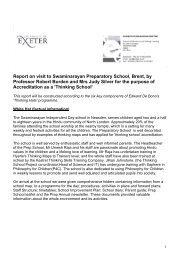April 2009 Annual Subscription Rs. 60 - Swaminarayan Sanstha
April 2009 Annual Subscription Rs. 60 - Swaminarayan Sanstha
April 2009 Annual Subscription Rs. 60 - Swaminarayan Sanstha
Create successful ePaper yourself
Turn your PDF publications into a flip-book with our unique Google optimized e-Paper software.
ca, for example, increased from $100 million in<br />
1980 to $15 billion in 2004.<br />
Man’s innate desire for material wealth is<br />
fuelled by unscrupulous enterprises exploiting<br />
his vulnerability. An endless availability of borrowing<br />
to satisfy the hedonistic wishes of<br />
instant gratification has transformed dreams<br />
into attainable objects, albeit synthetically. What<br />
was once out of reach became readily available.<br />
This led to a false economy, in which properties<br />
and goods were acquired by those who could<br />
not afford such possessions.<br />
The consequence that the world is seeing for<br />
individuals is devastating. Repossessions of<br />
homes are at record levels, recorded at an average<br />
of 124 homes per day in the United Kingdom<br />
alone. Families are being evicted from their lavish<br />
properties because they cannot afford to pay their<br />
mortgages. The average amount borrowed by an<br />
individual outside of their mortgage is almost<br />
£5,000. An unknown author has poignantly stated<br />
‘Hindsight explains the injury that foresight<br />
would have prevented’. The foresight is encompassed<br />
within the words of Bhagwan<br />
<strong>Swaminarayan</strong>. His principles were established to<br />
prevent families from suffering this pain.<br />
One may naturally counter and suggest that<br />
a desire for wealth leads to such consequences<br />
in the most extreme of circumstances, and the<br />
sequence of events that has lead to the modern<br />
financial crisis are unlikely to be repeated.<br />
However, as Pramukh Swami Maharaj states,<br />
“There is no reason to believe that money alone<br />
brings happiness. One who is rich has many<br />
dangers to face. One who owns expensive possessions<br />
is ever concerned about safeguarding<br />
such articles. Today, many have progressed and<br />
accumulated wealth, yet with this comes the<br />
problem of taxes that burdens the mind. Wealth<br />
and materialistic possessions yield initial happiness,<br />
but within them are intrinsic problems.<br />
Thus, even the rich are unhappy and that is<br />
why Tulsidas says happiness lies in God and his<br />
holy Sadhu...”<br />
The lessons to be learned from the words of<br />
Bhagwan <strong>Swaminarayan</strong> and Pramukh Swami<br />
Maharaj are twofold: first, money is no surety of<br />
lasting and permanent happiness; moreover, it<br />
brings associated unhappiness; and second, the<br />
desire for material objects can lead one to borrow<br />
to satisfy one’s wishes, and in some cases, to borrow<br />
an amount that one cannot afford to repay.<br />
This action ultimately yields unhappiness.<br />
Pramukh Swami is a living embodiment of<br />
detachment. Dressed in orange robes and<br />
always accompanied by the murti of Thakorji,<br />
he inspires youths to remove their desires for<br />
the riches of this world and become engaged in<br />
the devotion of God. He invariably reminds us<br />
that we arrived on this earth without a penny,<br />
and will leave without taking any possessions.<br />
Although he underlines the problems associated<br />
with desire for wealth, he also guides people to<br />
focus their energies on God, the provider of true<br />
and lasting happiness.<br />
Man has abandoned all notion of what is<br />
necessary to survive, even to live comfortably.<br />
The requirements are now beyond what is<br />
required to sustain a healthy, prosperous life. It<br />
is said, “The earth provides enough to satisfy<br />
every man’s need, but not every man’s greed.”<br />
This discussion on individual carelessness and<br />
misplaced priorities also applies to the large<br />
corporations who have provided the means for<br />
slapdash individuals to embark upon their dangerous<br />
journey of debt.<br />
BC Forbes, founder of the Forbes Business<br />
Magazine believes, “The man who has won millions<br />
at the cost of his conscience is a failure.”<br />
The corporations who were recording massive<br />
revenues from their ethically questionable practises<br />
ultimately failed and brought many others<br />
to their knees. Thus, the conclusion of the principles<br />
established by Bhagwan <strong>Swaminarayan</strong> is<br />
that sometimes, when you hold out for everything,<br />
you walk away with nothing.<br />
◆<br />
16 <strong>Swaminarayan</strong> Bliss ◆ <strong>April</strong> <strong>2009</strong>
















